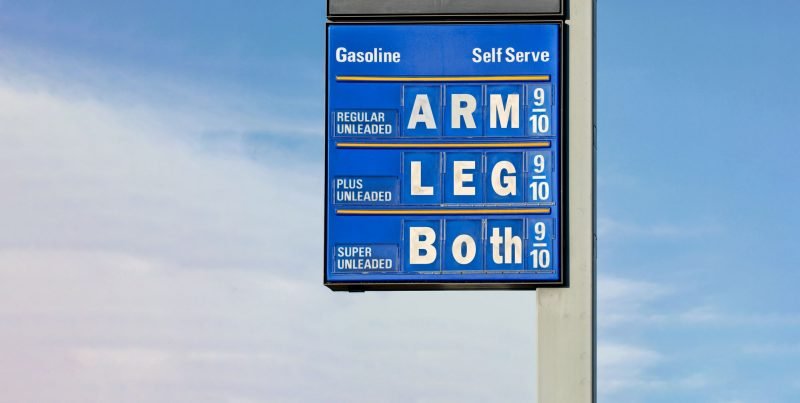If you travel in an RV or even just drive your car around town, it’s impossible not to notice the increase in gas prices over the past few months. For everyday drivers, it can be annoying and stressful. But for frequent travelers or those with extremely low mileage vehicles like RVs, it can be a severe financial blow that affects your life choices going forward.
But will the extra costs impact the number of RVers hitting the road in 2022? Let’s take a closer look at gas prices, why they’re rising, and what you can do to lessen the burden on your bank account.

Why Are Gas Prices Increasing?
There are several factors behind the recent rise in gas prices. For one, they’re coming off relatively low levels of gas usage reached during the height of the COVID-19 pandemic.
As millions of people stayed home and skipped their daily drive to work, demand plummeted, and prices with it. Now, driving is returning to pre-pandemic levels, and demand is soaring again. On top of that, there’s likely extra driving due to pent-up demand for travel.
Where Is Gas Cheapest in the U.S.?
While gas prices may vary from gas station to gas station, you’ll typically find the lowest prices in the south and midwest. This is partly due to lower gas taxes in many of these states.
However, some southern states also benefit from their location on or near the Gulf of Mexico, a major oil-producing area and home to many of the nation’s refineries. On the flip side, gas prices tend to be the most expensive in the northeast and on the west coast.

Will Soaring Gas Prices Mean Fewer RVers on the Road?
While it’s hard to predict exactly how people will respond to changes in prices, it’s reasonable to suspect a significant increase in one of the biggest expenses for RVers would discourage at least some RVers from traveling. Those new to the RV world may not even take the plunge, as they calculate their long-term budget based on current gas prices.
However, some RVers may simply travel less, or full-timers will spend more time in one place. This wouldn’t reduce much of the recent crowding at many RV parks and campgrounds, at best shifting around most of the same people.
Including the gas, you might not want to know!
What Is the Average MPG for an RV?
If you’re used to driving a regular car, brace yourself. Even the most gas-guzzling cars and trucks generally don’t approach the single-digit or low double-digit mileage of most motorhomes and trailers. Typically, you’ll see between 5 and 15 MPG driving in your RV.
Of course, this will depend greatly on the size of your RV, type of engine, and driving style.

Does a Diesel RV Get Better Gas Mileage?
In many cases, the answer is yes, with a significant but. All else being equal (size, driving style, weight, etc.), a diesel RV will tend to get a few miles per gallon more than its gas-powered cousin. But before you switch to a diesel rig, don’t forget the dollars and cents of the issue!
Diesel tends to cost 20-30 cents more per gallon than regular-grade gasoline, meaning you’ll be paying even more at the pump. This extra cost may eat up some or all of your mileage gains, making it potentially a wash for some RVers. You’ll need to carefully consider these factors if you’re thinking of making a switch for financial and gas-related reasons.
How Can I Get Better Gas Mileage in My RV?
There are a few simple ways to improve your RV’s gas mileage, no matter how often you travel or what kind of rig you have. First, it’s crucial to get regular maintenance on your RV or the vehicle towing your trailer. If you take care of your engine, it will run more efficiently and boost your MPG.
It’s also helpful to modify your driving style slightly. Keep speeds constant through the use of cruise control and avoid driving faster than 55-60 MPH.
This will also help moderate your fuel usage, even if it may take slightly longer to get to your destination. You should also avoid idling whenever possible. This can be one of the biggest wastes of your precious gas or diesel.
Finally, you shouldn’t forget about your rig itself and the things in it. If you can travel lighter, you’ll improve your gas mileage. The less weight you’re pulling, the easier it is for your engine, helping reduce overall usage.

Is RVing Worth It When Gas Prices Are High?
Money and finances can be the most challenging issues to make firm judgments about, as we all have different values. For some with a limited budget, the increase in gas prices might, unfortunately, put RVing out of reach for now. For others with more flexibility, it might still require sacrifices in other areas of their spending.
Each person and family will need to make their own determination about whether the sacrifices are worth it. However, even with higher costs, RVing provides one-of-a-kind experiences. It can quickly make you forget about your trips to the gas station.
Have higher gas prices impeded your travel plans yet?
If You Want the Latest Travel News, Join Our Mailing List
Don’t rely on biased RV industry news sources to keep you informed. Stick with Nomadic News. We publish articles and breaking stories that matter to you every weekday.










